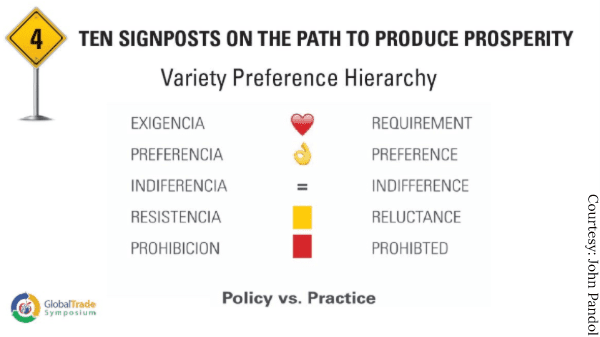We can all agree the produce industry is a people business built on trust, but we also know there are buyers and sellers you can really trust and ones you can only trust on a deal-by-deal basis.
Trusted business partners become preferred partners who can grow strategically.
Here are two business practices that can get you to where you want to be.
Policy vs. Practice:
Most organizations have business rules or guidelines. What are the consequences for violating them? Or put another way, how does your business partner’s policy match its practice?
In his December presentation at the New York Produce Show, John Pandol, director of special projects for Pandol Bros. BB #:111977 Delano, CA, talked about 10 industry issues, and this was one.
“What’s the best kind of buyer?” he asked attendees. “When policy and practice are aligned.”
As a grape shipper, he said doing store checks are an easy way to see if a retail buyer is following its own rules.
“From time to time a customer says they will not buy this or that, but during the store checks those same items are found at retail,” he says. “In reality it may be that they don’t want or need to do business with us and just make up some objection.”
Pandol said he likes to use a five-grade scale when he discusses which varieties will work for a customer. It goes from required to preferred to indifferent to reluctant to prohibited.
If a buyer makes these grades clear and sticks to them, the relationship goes much smoother.


Being considerate:
We know how to define consideration in our personal lives, but it goes a long way in business too.
A good way to be considerate in business is to look at the other side of a deal’s perspective. Finding agreements that benefit both parties lead to long-term partnerships.
But when a deal isn’t going to work, being considerate can be as simple as telling a potential partner the truth that it won’t work and not being afraid to hurt his or her feelings.
Pandol said a potential buyer could avoid a lot of unnecessary effort and bad will just by being more honest.
“The flip side is, [telling us] ‘You’re a fine company and we would love to do business with you, but we’re happy with our current suppliers and have no reason to fire them.’”
Another example is when a company changes a rule that affects its partners.
It tells a partner there are no exceptions to this change, but then it makes exceptions or changes direction after its partners made costly adjustments.
“I think one of the worst examples was a chain in the 90’s that announced it would only buy grapes and tree fruit in the ‘euro’ 5-down foot print boxes,” Pandol says. “This implied not only purchasing new materials but redoing equipment and pack lines to accommodate this size box. Two weeks into the season this chain was buying all box styles equally.”
That’s the kind of business partner people despise.
“The opposite are chains than change a box, bag or clamshell specification but let you ship most or all of existing inventory,” he says.
It’s as simple as being considerate to a business partner, which is good business.



